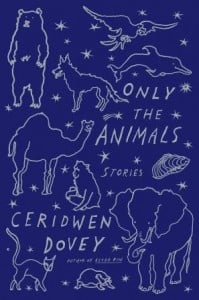A Russian tortoise launched into space during the Cold War. A Lebanese parrot abandoned on the doorknob of a pet store during Israel’s 2006 bombing of Beirut. A US Navy-trained dolphin called to serve in the Second Gulf War. These are some of the protagonists in Only the Animals, Ceridwen Dovey’s captivating collection of short stories that explores the many expressions of the human-animal relationship.
The narrators in Dovey’s fictional tales are animals—not their live selves, but their souls—and it’s this convention that sets up the tension in each story, along with the settings—human conflicts dating back to the late nineteenth century where the animals, directly or indirectly, meet their end.
In addition to the tortoise, the parrot, and the dolphin, readers hear from a blue mussel whose life begins in New York City and ends attached to the hull of a battleship docked at Pearl Harbor; a Germanic wolf-dog exiled to a Polish forest by his master, Heinrich Himmler; a black bear starving in a Serbian zoo during the siege of Sarajevo. Still other storytellers include a camel in colonial Australia, a female elephant in Mozambique, an ape in Germany, and a Parisian cat on the front line during World War I.
This premise—animals’ life-stories divulged in their afterlife—might seem gimmicky, but Dovey succeeds in both craft and content. In so doing, she gifts her readers stories that are at times amusing and quirky, at times sad and haunting, but always richly imagined and thoroughly researched.
Indeed, the research Dovey has done, allowing her to authentically build the scenes in which she lets loose her imagination, is expansive. Beyond studying wars of the past hundred-plus years, Dovey, a Harvard-trained social anthropologist, also delved into the literary works of writers who have populated their stories and poems with animals. Many of these writers—some well-known, some less so (Google may come in handy)—have cameos in the stories. Thus, the Navy-trained dolphin writes letters to Sylvia Plath and disdains the animal poetry of her husband, Ted Hughes. The nomadic mussel speaks with the voice of Jack Kerouac. And the Russian tortoise endears himself first to Tolstoy’s daughter, then to George Orwell, and finally to Virginia Woolf, who, Dovey tells us, believed that throughout history, great writers have turned to animals to speak for them when they “could at one stage find no way to say what they wanted to say.”
At its heart, Dovey’s collection of stories probes how humans and animals encounter one another in a fraught world, and how humans encounter each other. “Why do you sometimes treat other people as humans and sometimes as animals?” the dolphin asks. “And why do you sometimes treat creatures as animals and sometimes as human?” Dovey provides no answers to these questions or to questions about the human capacity for empathy and the futility of war. What she’s done in Only the Animals is focus her anthropologist’s eye on the interactions and interconnectedness of all beings as a means of illuminating human nature.
Jacki Skole is a writer, communications professor, aspiring yogi and dog lover. Dogland: A Journey to the Heart of America’s Dog Problem is her first book.

